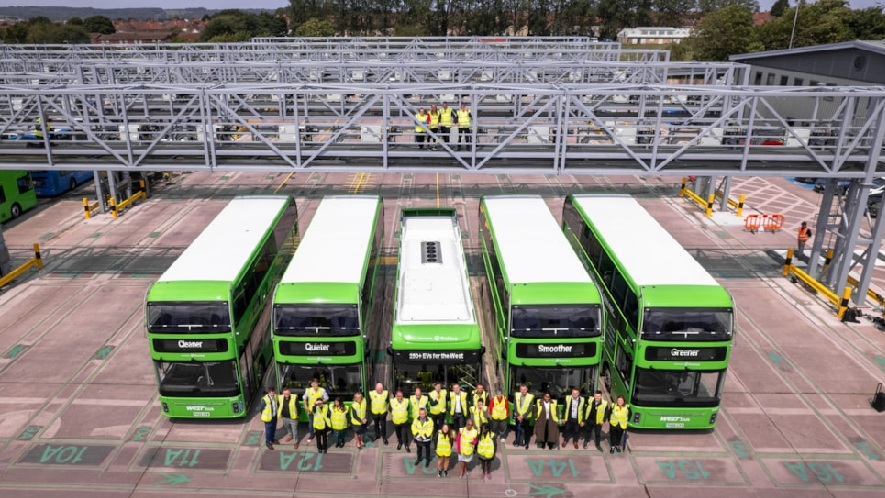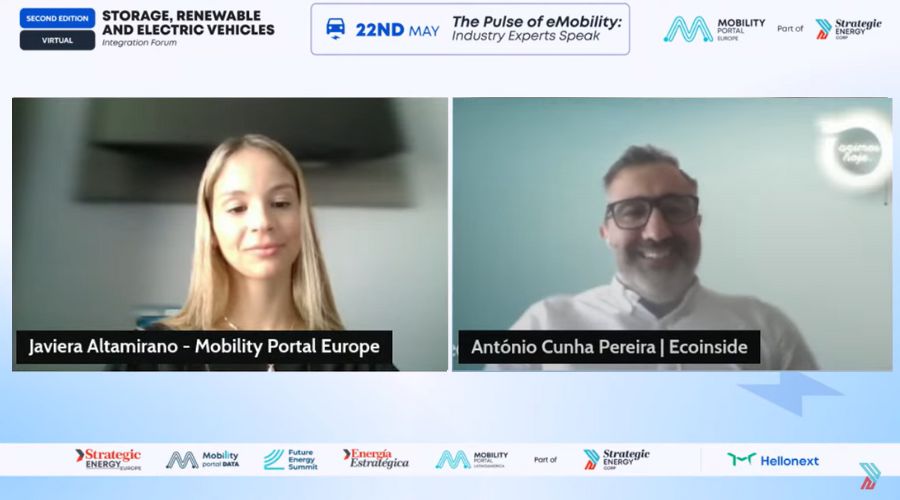The 44 million pounds project was unveiled at Hengrove by Local Transport Minister Simon Lightwood, Mayor Helen Godwin and First Bus’ Acting Managing Director Rob Pymm.
The depot in south Bristol has been transformed thanks to a 37.4 million pounds investment from First Bus and 6.6 million pounds funding from the government’s Zero Emission Bus Regional Areas (ZEBRA) project via the West of England Mayoral Combined Authority.
The funding will also see 74 new electric buses on the streets this summer, transporting more than 230,000 passengers per week on seven key services across the city.
Just three months ago, First Bus unveiled the West of England’s first electrified depot in Weston-super-Mare following a 14.9 million pounds investment, including 24 new electric buses.
On June 3rd, the official inauguration took place for five enormous gantries, installed by NG Bailey, on a football pitch-sized site right next to the A4174 in South Bristol. These gantries will power the 74 new electric buses in the area, which make up approximately two-thirds of First Bus’s Hengrove fleet.
The new zero-emission buses boast modern interiors with USB charging points for each seat, a camera monitoring system instead of wing mirrors for added safety and a smoother, quieter and more reliable ride for customers.
Pymm from First Bus says: “The opening of our first electrified depot in Bristol is not only a key moment on our journey to a fully electric fleet by 2035, but also demonstrates our commitment to providing customers with a smoother, quieter and cleaner bus network in the West of England.”
“I’m proud of the pace our teams are working to bring this revolution in public transport to our region, and I’m looking forward to the next phase of electrification in Bath and at our other Bristol depot at Lawrence Hill,” he adds.
This project is the latest good news for electric bus services in the West of England.
In April, it was announced a further 90 million pounds was being invested in 160 extra zero-emission buses and the electrification of the UK’s only island bus depot in Bath, and Lawrence Hill in Bristol.
The additional buses mean the Hengrove depot will be operating a fully electric fleet by next summer.
The Mayor of the West of England states: “I promised to work with government to get our region moving. The first of over 250 brand-new, comfy, electric buses for our region are a great start in a new chapter for the West of England, as we work with local councils and bus operators to deliver the best for the West.”
She continues: “29 million pounds secured from government and 120 million pounds from First Bus has already electrified the Hengrove depot with new charging infrastructure, as well as the one in Weston-super-Mare. This landmark investment in our wider area will also see a fully electric fleet at Hengrove by next summer and will soon turbo-charge the depots in Bath and Lawrence Hill too.”
Local Transport Minister indicates: “We’re bringing cleaner, quieter, and smoother bus journeys to Bristol and beyond – backed by 38 million pounds in government funding and even more from private investment.”
“With our upcoming Bus Services Bill, passengers can expect more reliable services, stronger local control, and protection for vital routes.”
READ MORE
-
DATA MODUL and the key to success: Why use touchscreens as the HMI core in charge points?
Connectivity, intuitive usability and durability are now key demands from users at charge points. That’s why outdoor touchscreens must ensure readability, resilience and continuous operation to meet these new standards. Moreover, integrating them opens up new revenue streams through advertising.
-
Ecoinside’s Success Formula? Winning eMobility Tenders and Over 300 Charging Points by 2025
The Portuguese company aims to double its network of electric vehicle chargers by the end of 2025. How will it achieve this ambitious goal?
-
Product Showroom Virtual Summit: Highlighted Key Trends in the eMobility Ecosystem
Each of the catalogues presented covered everything from cutting-edge fast chargers to integrated energy management systems, all designed to support a more sustainable and accessible mobility ecosystem. Below are some of the key statements shared.










